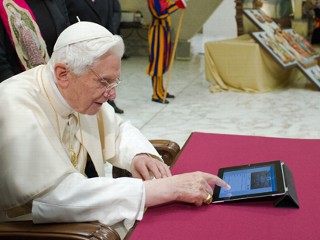Today, Pope Benedict XVI set a milestone for the Catholic Church when, for the first time (and with a lot of assistance), he used an iPad to tweet to his 1 million+ followers all over the world. Okay, maybe he is a little behind the times in terms of exponentially evolving technology, but I find this to be indicative of a changing global landscape, one where technology (and more specifically, social media) will increasingly influence the way states interact with their citizens, and how they interact with each other. Whether this influence is positive or negative, however, remains to be seen.
Social media's influence on foreign relations is not necessarily a new trend. The Arab Spring is perhaps the first example of a major international conflict being substantially impacted by the Internet. Before the Internet's inception, many of the atrocities carried out in the Middle East and Africa were unbeknownst to the rest of the world, save for the few individuals who could physically visit those regions. What the Arab Spring demonstrated was that with a few cell phone cameras and web access, pictures and videos could be widely and rapidly distributed to the rest of the world. There was also increased coordination between rebels and protestors, as they were able to communicate via online forums when their cell phone service was cut. Ultimately, all of this resulted in the pressure put on leaders in the Middle East to provide aid and assistance being enormous and unprecedented.
Sometimes this rapid dissemination of information is not necessarily beneficial for a country, though, as indicated by Sweden's twitter experiment earlier this year. Things started off well when Sweden decided to let one ordinary citizen each week use the country's twitter account, but the concept quickly deteriorated when one citizen began tweeting offensive remarks directed towards Jews. This marked the end of the Swedish experiment and set an example for other countries of how Twitter can sometimes be a dangerous weapon.
This has not stopped countries all over the world from trying to adapt to the ever-changing technological environment. Most heads of state have their own twitter account, and the U.S. State Department, USAID, the U.N., and many other important foreign policy-related bodies tweet constantly every day. While many interactions remain strictly formal, twitter and facebook have become easier ways for people all over the world to stay connected and communicate, and leaders everywhere are understanding this more and more.
Pope Benedict XVI joins the ranks of the Dalai Lama, President Obama, and many other influential leaders on twitter today, and I'm glad. Social media is just the next step forward in globalization, and a more connected world. And who knows? Maybe soon we'll be seeing Obama giving shoutouts to Putin and vice versa over the twitterverse. That will be the day.


No comments:
Post a Comment